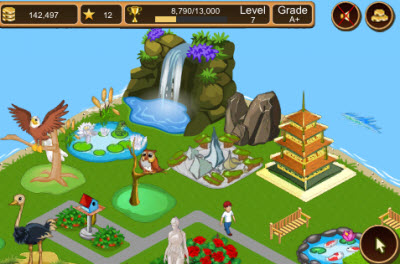
Sometimes, youth and inexperience can be a great advantage. Pocket Gems is a new breed of game company that was born in the era of free-to-play games on smartphones. And that’s why Daniel Terry, chief executive of the young San Francisco company, thinks it can be a winner.
Older game companies are bigger and more experienced at making mobile games. But Terry said in an interview that Pocket Gems was born at the right time in the fall of 2009.
“To win on mobile, it has to be the focus of your business,” Terry (pictured right) said in an interview. “Mobile is absolutely the fastest-growing game business now. Huge businesses are going to be built on mobile.”
AI Weekly
The must-read newsletter for AI and Big Data industry written by Khari Johnson, Kyle Wiggers, and Seth Colaner.
Included with VentureBeat Insider and VentureBeat VIP memberships.
So far, so good. Pocket Gems has had more than 30 million downloads. In March, the company had more than 1.55 million downloads, making it the No. 4 game company during the month, according to app store search company Xyologic. In April, the number of Pocket Gems downloads increased to 1.9 million in the U.S. Tap Zoo is the most popular Pocket Gems game, with 970,000 downloads in April, according to Xyologic.
 Terry thinks the growing interest in mobile games isn’t a sign of a bubble. Rather, it reflects real growth, he said, inspired by a big change in the market. Just as Pocket Gems started, Apple launched its in-app purchase system, which allowed gamers to buy items from within a game. That enabled the free-to-play business model that worked so well on Facebook for Zynga. Users can download and play a game for free. But they can pay real money for virtual goods inside the game.
Terry thinks the growing interest in mobile games isn’t a sign of a bubble. Rather, it reflects real growth, he said, inspired by a big change in the market. Just as Pocket Gems started, Apple launched its in-app purchase system, which allowed gamers to buy items from within a game. That enabled the free-to-play business model that worked so well on Facebook for Zynga. Users can download and play a game for free. But they can pay real money for virtual goods inside the game.
Three of the company’s iPhone games have shot to the top three ranks on the Apple App Store. Now the company has a loyal group of followers and can more easily launch new games for this crowd. This consistency is one reason the company was able to raise $5 million from Sequoia Capital in December.
Pocket Gems was founded by Terry and Harlan Crystal while they were at graduate school at Stanford University. They created their first game, Tap Farm, while they were still in school. After it took off, they formed Pocket Gems. Terry says the team tries to design games that have high engagement and broad reach. Besides Tap Farm, the games include Tap Store, Tap Jungle, Tap Zoo and Tap Zoo Christmas. Tap Zoo is more than eight months old, but it’s still monetizing. And Tap Pet Hotel (pictured below) just broke into the top 25 games of April.
“Pocket Gems’ remarkable month over month user and financial growth shows they can consistently create highly engaging games that will dominate the mobile platform,” said Jim Goetz, a partner at Sequoia Capital.
 With more than 500,000 apps in the App Store, it’s easy to get lost. To come up with one hit after another is certainly against the odds. There’s lots of mobile game competitors, such as Electronic Arts, Zynga, TinyCo, DeNA-Ngmoco, Digital Chocolate, Glu Mobile, Backflip Studios and others. But Terry says that focus will help win the war.
With more than 500,000 apps in the App Store, it’s easy to get lost. To come up with one hit after another is certainly against the odds. There’s lots of mobile game competitors, such as Electronic Arts, Zynga, TinyCo, DeNA-Ngmoco, Digital Chocolate, Glu Mobile, Backflip Studios and others. But Terry says that focus will help win the war.
“We think it comes down to our game design philosophy,” Terry said. “We obsess over details and hand craft everything.”
While other game companies started making games for the iPhone much earlier, Terry believes that Pocket Gems got the free-to-play elements right, so that its games become popular and monetize well. The games are bite-sized pieces of entertainment, where you play for a short time but come back to the game over and over again.
Terry says that the company has now grown to 31 people and hopes to have 60 by the end of the year. The added staff will allow Pocket Gems to expand into Android games. Terry says the company wants to reach a broader audience. Pocket Gems is also looking at making games for the HTML5 web standard so that its games can run on more platforms more easily. But it won’t do so if it means a trade-off in the performance of the game.
The company is trying to focus its culture around doing the best mobile engineering. By focusing on having a good team, the company hopes to survive any shakeout as mobile game developers begin to consolidate. One challenges the company faces, though, is finding enough people to hire in San Francisco, where a social media boom has everyone scrambling to hire good engineers. Over time, the company expects to grow overseas.
“We want to be ubiquitous,” Terry said. “We want to be on every platform.”
 We’ll be exploring the most disruptive game technologies and business models at our third annual GamesBeat 2011 conference, on July 12-13 at the Palace Hotel in San Francisco. It will focus on the disruptive trends in the mobile games market. GamesBeat is co-located with our MobileBeat 2011 conference this year. To register, click on this link. Sponsors can message us at sponsors@venturebeat.com. To participate in our Who’s Got Game? contest for the best game startup, click on this link.
We’ll be exploring the most disruptive game technologies and business models at our third annual GamesBeat 2011 conference, on July 12-13 at the Palace Hotel in San Francisco. It will focus on the disruptive trends in the mobile games market. GamesBeat is co-located with our MobileBeat 2011 conference this year. To register, click on this link. Sponsors can message us at sponsors@venturebeat.com. To participate in our Who’s Got Game? contest for the best game startup, click on this link.
VentureBeat's mission is to be a digital town square for technical decision-makers to gain knowledge about transformative enterprise technology and transact. Learn More